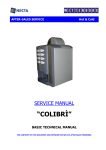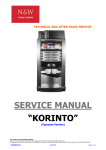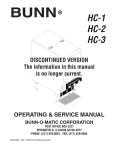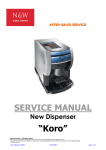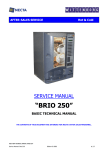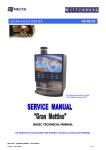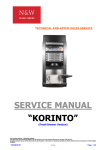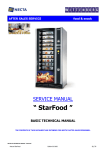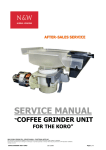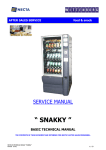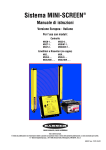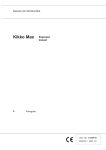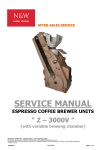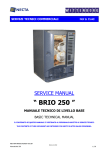Download Service - Expert-CM
Transcript
AFTER-S ALES SERVICE SERVICE MANUAL “” (Espresso Version “single boiler”) NECTA SPA TECHNICAL MANUAL “ Brio 3 “ This document was produced by MARK AC for the exclusive use of the technical personnel in the after-sales service. . No part of this document may be divulged to a third party or reproduced partially or entirely without the prior permission of NW GLOBAL VENDING . All rights reserved. New Brio 15/05/2006 page 1 / 43 TABLE OF CONTENTS 1 1.1 2 3 4 5 6 7 8 8.1 8.2 9 10 11 12 13 14 15 16 17 18 19 20 21 22 23 24 25 26 27 INTERNAL MAIN COMPONENTS LIST OF MAIN COMPONENTS TECHNICAL DATA AND FEATURES ELECTRICAL SAFETY AND RELEVANT STANDARDS REQUIREMENT FOR THE USERS HYDRAULIC LAYOUT “ESPRESSO” HYDRAULIC LAYOUT “OPEN-TOP BOILER” INTERNAL LAYOUTS AND MACHINE CODES ELECTRICAL SYSTEMS – CONNECTIONS CONNECTION OF ELECTRONIC BOARDS GENERAL WIRING DIAGRAMS ACTUATION BOARD – CONFIGURATIONS CPU BOARD AIR-BREAK & BOILERS PUMPS & BY-PASS ESPRESSO COFFEE BREWER UNIT CUP DISPENSER ASSEMBLY SUGAR AND STIRRER DISPENSER ASSEMBLY SPOUTS ASSEMBLY CUP POSITIONING UNIT POWDER PRODUCT CONTAINER AND DOSER DEVICES ASSEMBLY MIXER ASSEMBLY GRINDER AND DOSER DEVICE ASSEMBLY POWDER AND LIQUID DOSE TABLES ROUTINE AND EXTRAORDINARY MAINTENANCE SCHEDULE TROUBLE-SHOOTING HACCP DIRECTIVE DAILY CLEANING AND HYGIENE SCHEDULE WEEKLY CLEANING AND HYGIENE SCHEDULE MONTHLY CLEANING AND HYGIENE SCHEDULE Pag. 3-4-5 -6 Pag. 7 Pag. 8 Pag. 9 Pag. 9 Pag. 10 Pag. 11 Pag. 12 Pag. 13 Pag. 13 - 15 Pag. 16 Pag. 17-18-19 Pag. 20-21 Pag. 22-23 Pag. 24 Pag. 25 Pag. 26 -27 Pag. 28 Pag. 29 Pag. 29 Pag. Pag. Pag. Pag. 30 -31 32 33-34 35 Pag. Pag. Pag. Pag. Pag. Pag. 36 37-38-39 40 41 42 43 NECTA SPA TECHNICAL MANUAL “ Brio 3 “ This document was produced by MARK AC for the exclusive use of the technical personnel in the after-sales service. . No part of this document may be divulged to a third party or reproduced partially or entirely without the prior permission of NW GLOBAL VENDING . All rights reserved. New Brio 15/05/2006 page 2 / 43 1 - INTERNAL MAIN COMPONENTS 1 18 2 17 16 3 15 4 5 6 7 INTERNAL VIEW WITH DETAIL OF BREWER UNIT AND GRINDER AND DOSER ASSEMBLY 8 9 14 10 13 11 12 NECTA SPA TECHNICAL MANUAL “ Brio 3 “ This document was produced by MARK AC for the exclusive use of the technical personnel in the after-sales service. . No part of this document may be divulged to a third party or reproduced partially or entirely without the prior permission of NW GLOBAL VENDING . All rights reserved. New Brio 15/05/2006 page 3 / 43 1 - INTERNAL MAIN COMPONENTS 15 16 6 17 Contenitori solubili 21 8 22 1 18 4 Mixer 19 2 Ugelli mobili 23 20 Fustino fondi liquidi 24 25 INTERNAL VIEW WITHOUT PROTECTIVE CASING (PARTIAL ) NECTA SPA TECHNICAL MANUAL “ Brio 3 “ This document was produced by MARK AC for the exclusive use of the technical personnel in the after-sales service. . No part of this document may be divulged to a third party or reproduced partially or entirely without the prior permission of NW GLOBAL VENDING . All rights reserved. New Brio 15/05/2006 page 4 / 43 1 - INTERNAL MAIN COMPONENTS 20 25 INTERNAL VIEW WITHOUT PROTECTIVE CASING – DETAIL OF PUMP 26 28 27 DETAIL OF PRESSURE BO ILER NECTA SPA TECHNICAL MANUAL “ Brio 3 “ This document was produced by MARK AC for the exclusive use of the technical personnel in the after-sales service. . No part of this document may be divulged to a third party or reproduced partially or entirely without the prior permission of NW GLOBAL VENDING . All rights reserved. New Brio 15/05/2006 page 5 / 43 1 - INTERNAL MAIN COMPONENTS 29 30 31 32 DETAIL OF POWER SUPPLY UNIT 15 21 DETAIL OF ACTUATION BOARDS NECTA SPA TECHNICAL MANUAL “ Brio 3 “ This document was produced by MARK AC for the exclusive use of the technical personnel in the after-sales service. . No part of this document may be divulged to a third party or reproduced partially or entirely without the prior permission of NW GLOBAL VENDING . All rights reserved. New Brio 15/05/2006 page 6 / 43 1.1 - LIST OF MAIN COMPONENTS N° ref. Description 1 2 3 4 5 6 7 8 9 10 11 12 13 14 15 16 17 18 19 20 21 22 23 24 25 26 27 28 29 30 31 32 CUP STACKER SUGAR CANISTER SUGAR DOSER DEVICE CUP POSITIONING FORK SOLID WASTE CONTAINER LIQUID WASTE PAN TOP PANEL SAFETY LATCH COFFEE CANISTER COFFEE DOSER AND RELEASE UNIT FIRST COFFEE HEATER (OPTIONAL) ESPRESSO BREWER UNIT SPOUTS ASSEMBLY MIXER ASSEMBLY INSTANT PRODUCT CONTAINER MAIN ACTUATION BOARD RATIOMOTORS BOILER HEATING ELEMENT ACTUATION BOARD CABLE CONNECTION EXHAUST FAN VIBRATION PUMP SUPPLEMENTARY ACTUATION BOARD (OPTIONAL WITH COLD UNIT) GRINDER AND DOSER DEVICE ESPRESSO BOILER WATER INLET SOLENOID VALVE VOLUMETRIC COUNTER SOLENOID VALVE BLOCK HEATING CONTROL PROBE BIPOLAR THERMOSTAT FUSE HOLDER STRIP TRANSFORMER BOILER ACTUATION BOARD POWER SUPPLY INTERFERENCE SUPPRESSOR NECTA SPA TECHNICAL MANUAL “ Brio 3 “ This document was produced by MARK AC for the exclusive use of the technical personnel in the after-sales service. . No part of this document may be divulged to a third party or reproduced partially or entirely without the prior permission of NW GLOBAL VENDING . All rights reserved. New Brio 15/05/2006 page 7 / 43 2 - TECHNICAL DATA AND FEATURES Height (without base cabinet) 29.92" Width 21.25" Depth 23.03" Overall depth with door open 39.36" Weight 143lb Power supply voltage 120 V AC - 60 Hz Installed power 1400 W Capacity of cup dispenser Approx. 300 (70-71 dia.) Capacity of stirrer dispenser Approx. 255 Payment systems used: Coin mechanisms and 24 V DC validators with EXECUTIVE, BDV and MDB protocols Accessories: Water supply kit with 20 litre tank Equipped base cabinet and plain base cabinet Height extension for base cabinet (installation in a bank of machines) Master/slave kit (bank with Snakky) Irda kit, RS 232 jack kit Cup detection sensor Water supply: 7-123PSI 0.05-0.85 Mpa 0.5-8.5 . Power consumption To reach standby temperature 33.8 Wh For each hour of stand-by 63.7 Wh Base versions: Espresso – Instant – Fresh brewer Boiler temperature Adjustable via software setting Safety devices Main door-switch Water inlet solenoid valve with overflow device Manual-reset boiler safety thermostat Manual-reset instant boiler anti-boiling thermostat Air-break float jamming Liquid waste pan float Boiler sensor control (short-circuit or failure) Double heating and timing protection for: Pump – Doser devices – Coffee unit ratiomotor – Coffee grinder – Mixer motors Cup column shift ratiomotor – Cup release ratiomotor – Coffee release electromagnet Solenoid valves protected by own impedance (ED 100%) Fuse protection for: Transformers and electronic boards Controls Empty cup dispenser – Water failure – Empty coffee container – Brewer unit position – Full liquid waste pan – Boiler temperature. NECTA SPA TECHNICAL MANUAL “ Brio 3 “ This document was produced by MARK AC for the exclusive use of the technical personnel in the after-sales service. . No part of this document may be divulged to a third party or reproduced partially or entirely without the prior permission of NW GLOBAL VENDING . All rights reserved. New Brio 15/05/2006 page 8 / 43 3 - ELECTRICAL SAFETY AND RELEVANT STANDARDS The vending machine Brio 3 ES was designed and made in compliance with the provisions of the following directives and related European standards: MACHINE SAFETY EEC 98/37 EN 60529 UNI EN 292 –1-2 IEC 695-2-2 LOW-VOLTAGE DIRECTIVE EEC 73/23 ; EEC 89/392 ; EEC 89/336 (the low voltage directive covers all equipment powered with voltage below 400 V AC) The following European standards are applied: EN 60335-2-14 EN 60335-2-15 EN 60335-2-24 EN 60335-2-75 ELECTROMAGNETIC COMPATIBILITY DIRECTIVE EN 61000-3-3 EN 61000-4-2 EN 61000-4-3 EN 61000-4-4 EN 61000-4-5 EN 61000-4-11 ---…----…---…--With regard to Low Voltage and Electromagnetic Compatibility this vending machine was tested and certified by a certifying body authorised by ministerial decree: IMQ. It is therefore prohibited (on pain of voiding the warranty and the responsibility of the certification) to replace any electrical component with non-original parts during the routine and extraordinary maintenance operations. Therefore it is also prohibited to: Tamper with or deactivate the safety systems installed in the vending machine. Install the vending machine outdoor or in any case in a place that is not protected from the weather. Use the vending machine for purposes other than those indicated in the sales contract. Connect the vending machine by means of extension cords or multiple sockets and/or adapters. Use water jets for cleaning. Then, it is also compulsory to: Verify the conformity and suitability of power supply line and of the power outlet. 4 – REQUIREMENT FOR THE USERS For safety purposes, three different operators with different qualifications have been defined. USER The user is practically the final user who buys the products from the machine. The user must not have any access whatsoever to the inside of the machine. PERSON IN CHARGE OF REFILLING AND ROUTINE CLEANING The person responsible for refilling has the key for opening the machine and is in charge of the refilling, cleaning and internal hygiene of the machine. He must not have any access to energised parts or moving parts. MAINTENANCE TECHNICIAN The maintenance technician must be a highly skilled person and must be aware of the electrical hazards in the event of complex technical operations and can operate with the machine switched on and the door open, using the safety key supplied. NECTA SPA TECHNICAL MANUAL “ Brio 3 “ This document was produced by MARK AC for the exclusive use of the technical personnel in the after-sales service. . No part of this document may be divulged to a third party or reproduced partially or entirely without the prior permission of NW GLOBAL VENDING . All rights reserved. New Brio 15/05/2006 page 9 / 43 5 – HYDRAULIC LAYOUT “ESPRESSO” 9 5 6 7 10 8 4 1 11 2 12 3 13 Hydraulic layout - “ESPRESSO” version ESPRESSO VERSION COMPONENTS (DOUBLE BOILER) REF. 1 2 3 DESCRIPTION WATER INLET SOLENOID PUMP AND BYPASS 4 VOLUMETRIC COUNTER WATER FILTER 5 AIR-BREAK REF. 6 DESCRIPTION 7 ESPRESSO SOLENOID ASSEMBLY PRESSURE BOILER 8 BREWER UNIT 9 MIXER WITH MOTOR 10 REF. 11 DESCRIPTION PAN FLOAT 12 LIQUID WASTE PAN 13 SPOUTS ASSEMBLY TEA MIXER The Espresso version is fitted with only one pressure boiler (with bypass set to 12 bar) for espresso coffee based selections and for instant products selections. The diagram shown is given only as a reference as it may differ for each version NECTA SPA TECHNICAL MANUAL “ Brio 3 “ This document was produced by MARK AC for the exclusive use of the technical personnel in the after-sales service. . No part of this document may be divulged to a third party or reproduced partially or entirely without the prior permission of NW GLOBAL VENDING . All rights reserved. New Brio 15/05/2006 page 10 / 43 6 – HYDRAULIC LAYOUT “OPEN-TOP BOILER” 5 6 7 8 9 4 3 10 11 2 1 COMPONENTS OF FRESH BREWER VERSION REF. DESCRIPTION REF. DESCRIPTION 1 WATER INLET SOLENOID 7 OPEN-TOP BOILER 2 LIQUID WASTE TRAY 8 INSTANT SOLENOID VALVES 3 4 PAN LEVEL MICROSWITCH ANTI-BOILING THERMOSTAT DRAIN PIPE 9 10 5 6 FB BREWER UNIT 11 MIXER SPOUTS ASSEMBLY OVERFLOW TUBE The Fresh brewer version is fitted only with an open-top boiler, having the operating pressure equal to the atmospheric pressure. NECTA SPA TECHNICAL MANUAL “ Brio 3 “ This document was produced by MARK AC for the exclusive use of the technical personnel in the after-sales service. . No part of this document may be divulged to a third party or reproduced partially or entirely without the prior permission of NW GLOBAL VENDING . All rights reserved. New Brio 15/05/2006 page 11 / 43 7- INTERNAL LAYOUTS AND MACHINE CODES EXAMPLES OF THE INTERNAL LAYOUTS Note: The following layouts are only given as a guideline for the purpose of indicating the configuration options. Refer to the tables supplied with the machine for the actual layout . ESPRESSO LAYOUT - ITALY Brio 3 ES 6 /IQ According to the market, two product selection modes are provided: Keypad with direct selection Keypad with numeric selection (see examples below) EXAMPLE OF INTERPRETING CODES ES6 /IQ - Meaning: ES = Espresso 6 = Number of containers I = Italy Q = IMQ certification The first two letters indicate: IN = INSTANT ES = ESPRESSO FB = FRESH BREWER The number indicates the number of containers installed. The last letter, if present, defines whether single (M) or double (D) boiler. The first letter after the bar defines the country The last letter - Q (if present) indicates that the machine is certified by IMQ If both ES and FB are present at the same time it means that the machine if fitted with two brewer units (ESPRESSO and FRESH BREW). LCD Display USER INTERFACE: EXAMPLE OF SELECTIONS AVAILABLE IN THE ES ITALY VERSION NECTA SPA TECHNICAL MANUAL “ Brio 3 “ This document was produced by MARK AC for the exclusive use of the technical personnel in the after-sales service. . No part of this document may be divulged to a third party or reproduced partially or entirely without the prior permission of NW GLOBAL VENDING . All rights reserved. New Brio 15/05/2006 page 12 / 43 8 - ELECTRICAL SYSTEMS – CONNECTIONS The machine is designed to operate under a single-phase voltage of 120V AC (+5-10V) It is protected with a main 15 A fuse on both phases. With regard to the transformer: the primary winding is protected with a 125 mA fuse the secondary winding is protected with a 1.25 A fuse It is fitted with a door opening safety switch. Power supply cable securing diagram Terminal box protection (lift cover) The power cable can be supplied as standard feature and chosen among the following types: HO5 RN – F copper with a 3 x 1.5 mm2 section HO5 V V – F ,, ,, ,, HO5 V V – F ,, ,, ,, Fitted with a fixed SCHUKO ** plug. NB **: it is possible that for some specific markets a cable with specific plug be fitted in accordance with the regulations in force in that country. In the event of replacement cables of exactly the same characteristics must be used. Since the “Brio 3” vending machine is approved by an electrical safety certification institute (IMQ), replacements with non-original components are not permitted. Otherwise the electrical safety certificate and the warranty will be void. Cable clamp Power supply cable 8.1 – CONNECTION OF ELECTRONIC BOARDS View of power supply compartment (detail without protective casing) 1 2 3 4 5 6 1 7 5 Coffee boiler control board Line cable connection clamp interference suppressor Transformer Terminal strip Transformer fuses Connection cable to Mini snack (Optional ) 6 2 7 3 4 NECTA SPA TECHNICAL MANUAL “ Brio 3 “ This document was produced by MARK AC for the exclusive use of the technical personnel in the after-sales service. . No part of this document may be divulged to a third party or reproduced partially or entirely without the prior permission of NW GLOBAL VENDING . All rights reserved. New Brio 15/05/2006 page 13 / 43 BOARD CONNECTION DIAGRAM CONNECTIONS TO THE CPU BOARD Signal DESCRIPTION SM LCD NTC NTCS CV RS 232 Actuation and control board SP IVB IVA IPF CMSB FA IP SUC LCD display card Espresso temperature control probe Instant temperature control probe Volumetric counter Printer or data reading device port (only if the relevant optional board is installed) Push-button board Cup sensor switch Water sensor (level) switch Liquid waste overflow switch Cup release motor cam Interference suppressor filter Door switch CPU board P OWER SUPPLY UNIT WIRING DIAGRAM NB: The above codes are indicated in the wiring diagrams and in the tables supplied with the machine. NECTA SPA TECHNICAL MANUAL “ Brio 3 “ This document was produced by MARK AC for the exclusive use of the technical personnel in the after-sales service. . No part of this document may be divulged to a third party or reproduced partially or entirely without the prior permission of NW GLOBAL VENDING . All rights reserved. New Brio 15/05/2006 page 14 / 43 MAIN ACTUATION BOARD SM1 REAR SIDE WITHOUT CASING – LOCATION OF ACTUATION BOARD AND SUPPLEMENTARY ACTUATION BOARD SM2 (OPTIONAL) NECTA SPA TECHNICAL MANUAL “ Brio 3 “ This document was produced by MARK AC for the exclusive use of the technical personnel in the after-sales service. . No part of this document may be divulged to a third party or reproduced partially or entirely without the prior permission of NW GLOBAL VENDING . All rights reserved. New Brio 15/05/2006 page 15 / 43 8.2 GENERAL WIRING DIAGRAMS NECTA SPA TECHNICAL MANUAL “ Brio 3 “ This document was produced by MARK AC for the exclusive use of the technical personnel in the after-sales service. . No part of this document may be divulged to a third party or reproduced partially or entirely without the prior permission of NW GLOBAL VENDING . All rights reserved. New Brio 15/05/2006 page 16 / 43 9 - ACTUATION BOARD – CONFIGURATIONS ( POSITIONING, LOGICS AND ACTUATION DIAGRAMS) The actuation board activates all 120 V AC power users by means of relays. It also controls the signals from the cams and micro-switches located on the various power users and controls the boiler board. The board is powered with 24 V AC through the power supply unit, which is incorporated into the electrical board. The control software is installed directly in the microprocessor. The GREEN LED (2) blinks during the normal operation of the board. The YELLOW LED (6) indicates the presence of 5 V DC. The RED LED (3) glows during the boards reset. The RED LED (11) glows when the instant boiler is activated. The two boilers are never activated simultaneously, but the espresso boiler will have priority. When the pre-set temperature is reached, the instant boiler will start. SM1 ACTUATION BOARD 12 9 10 13 14 11 20 8 7 15 6 5 16 4 3 17 2 1 19 18 NECTA SPA TECHNICAL MANUAL “ Brio 3 “ This document was produced by MARK AC for the exclusive use of the technical personnel in the after-sales service. . No part of this document may be divulged to a third party or reproduced partially or entirely without the prior permission of NW GLOBAL VENDING . All rights reserved. New Brio 15/05/2006 page 17 / 43 REF. DESCRIPTION 1 2 3 4 5 6 7 8 9 10 11 12 13 14 15 16 17 18 CONNECTOR FOR SIGNAL INPUT GREEN LED RED LED CONNECTOR NOT USED CONNECTOR FOR BOARD PROGRAMMING YELLOW LED CONNECTOR FOR BOARD POWER SUPPLY – 24 V CONNECTOR NOT USED CONNECTOR FOR PROBE AND BOILER CONTROL RED LED - ACTIVATION OF ESPRESSO BOILER RED LED – NOT USED CONNECTOR TO EXPANSION BOARD - 6 RELAYS 230 V AC POWER USERS 230 V AC POWER USERS 230 V AC POWER USERS 230 V AC POWER USERS CONNECTOR NOT USED 19 CONNECTOR NOT USED CAN-BUS CONNECTOR ** (Connector for the control of banked machines with GSM protocol) Reference To Relay Code (20) And Actuations - ESPRESSO / INSTANT Version SM1 Espresso Configuration Instant (see references in previous page) K K K K K K K 1 2 3 4 5 6 7 ESC MSB K K K K K K K 8 9 10 11 12 13 14 M K K K K K K K K K K 15 16 17 18 19 20 21 22 23 24 E1 E2 MSCB MSP VENT LF EV H2O MF3 MF2 MF1 MD Z PM ER E3 EEA MAC MD4 MD3 MD2 MD1 COFFEE RELEASE MAGNET CUP RELEASE MOTOR CUP STACKER SHIFT MOTOR STIRRER RELEASE MOTOR FAN LAMP HOT WATER DISPENSING SOLENOID VALVE COFFEE BREWER MOTOR WHIPPER 3 WHIPPER 2 WHIPPER 1 SUGAR DOSER DEVICE PUMP COFFEE DISPENSING SOLENOID VALVE INSTANT PROD. SOLENOID VALVE 1 INSTANT PROD. SOLENOID VALVE 2 INSTANT PROD. SOLENOID VALVE 3 WATER INLET SOLENOID VALVE NOT USED COFFEE GRINDER DOSER DEVICE 4 DOSER DEVICE 3 DOSER DEVICE 2 DOSER DEVICE 1 MD6 MSB MSCB MSP VENT LF EV H2O MF4 MF3 MF2 MF1 MDZ PM MF5 E1 E2 E3 EEA MD5 MD4 MD3 MD2 MD1 DOSER DEVICE 6 CUP RELEASE MOTOR CUP STACKER SHIFT MOTOR STIRRER RELEASE MOTOR FAN LAMP HOT WATER DISPENSING SOLENOID VALVE WHIPPER 4 WHIPPER 3 WHIPPER 2 WHIPPER 1 SUGAR DOSER DEVICE PUMP WHIPPER 1 INSTANT PROD. SOLENOID VALVE 1 INSTANT PROD. SOLENOID VALVE 2 INSTANT PROD. SOLENOID VALVE 3 WATER INLET SOLENOID VALVE NOT USED DOSER DOSER DOSER DOSER DOSER DEVICE 5 DEVICE 4 DEVICE 3 DEVICE 2 DEVICE 1 NECTA SPA TECHNICAL MANUAL “ Brio 3 “ This document was produced by MARK AC for the exclusive use of the technical personnel in the after-sales service. . No part of this document may be divulged to a third party or reproduced partially or entirely without the prior permission of NW GLOBAL VENDING . All rights reserved. New Brio 15/05/2006 page 18 / 43 SM2 - 6-relay board Optional in conjunction with the cold unit Optional in conjunction with the mini snack RL1 RL2 RL3 RL4 RL5 RL6 W IRING DIAGRAM – CONNECTION TO UPS NECTA SPA TECHNICAL MANUAL “ Brio 3 “ This document was produced by MARK AC for the exclusive use of the technical personnel in the after-sales service. . No part of this document may be divulged to a third party or reproduced partially or entirely without the prior permission of NW GLOBAL VENDING . All rights reserved. New Brio 15/05/2006 page 19 / 43 10 - CPU BOARD ( Central processing unit ) The CPU control board, located inside the payment system compartment, processes t he information from the pushbuttons, the payment system and from the sensors installed throughout the machine; it also controls the actuations and the push-button board. It is built on SMT technology. The LEDs furnish the following indications during the vending machine operation: The GREEN LED (3) blinks during normal operation The YELLOW LED (4) glows when 5 V DC is detected The RED LED (16) - Glows during the software reset phase Two other boards are also installed: PUSH-BUTTON CARD located on the inside of the door, controls the alphanumeric display and it processes the pushbutton commands; it also supports the coin mechanism connectors and the RS232 printer port. DISPLAY CARD It processes the information and converts it into readable signals. 8 5 6 9 10 11 12 13 14 7 15 16 4 3 17 2 18 1 22 21 20 19 CPU BOARD DETAIL The CPU board is fitted with FLASH EPROM; such component is used for re-writing the software that is modified for updating or for changing configuration. Therefore, using a Personal Computer and specific control software, the machine software can be re-written without replacing the EPROM. The system permits software update simply and quickly for the entire operating life of the vending machine. Using the “Flash system” it is also possible to transfer the settings from one vending machine to another. This is the same board used in the Kikko and the only difference is the software and the positioning. NECTA SPA TECHNICAL MANUAL “ Brio 3 “ This document was produced by MARK AC for the exclusive use of the technical personnel in the after-sales service. . No part of this document may be divulged to a third party or reproduced partially or entirely without the prior permission of NW GLOBAL VENDING . All rights reserved. New Brio 15/05/2006 page 20 / 43 LIST OF CPU BOARD COMPONENTS 1 J14 Coin mechanism power supply 15 J9 Not used 2 J15 Board power supply 16 J10 LCD Display 3 GREEN LED RUN DL2 17 J11 Push-button panel 4 Yellow led 5 VDC DL1 18 J16 push-button panel 5 J1 24 V Output 19 J12 MDB coin mechanism 6 J2 24 V Output 20 Coin mechanism Minidips 7 RED LED reset CPU DL3 21 J13 Expansion for BDV / EXE 8 J3 Input / Output 22 RS232 serial port 9 J4 Not used 23 Cup release button 10 J5 Programmer (RS232 ) 24 Statistic reading button 11 J6 Not used 25 Failure reset button 12 J7 CAN - BUS 26 Mixer wash button 27 Programming access button 28 CPU board 13 14 Button not used J8 Validators 23 22 24 25 28 26 27 Service buttons board DETAIL OF CPU BOARD LOCATION (internal side of door without protective casing) NECTA SPA TECHNICAL MANUAL “ Brio 3 “ This document was produced by MARK AC for the exclusive use of the technical personnel in the after-sales service. . No part of this document may be divulged to a third party or reproduced partially or entirely without the prior permission of NW GLOBAL VENDING . All rights reserved. New Brio 15/05/2006 page 21 / 43 11 – AIR-BREAK & BOILERS The air-break is a functional unit with the function of keeping the water level constant and of signalling a water flow interruption from the mains; in the event of such water failure it serves the purpose of completing the current selection. In addition, in the espresso version, it serves the purpose of holding a reservoir of water at normal atmospheric pressure, so that the pump can draw the correct water dose for the selection and deliver it to the Espresso boiler without changes in pressure that may affect the volumetric counter reading. With regard to the BRIO 3 vending machine the air-break is installed in both the espresso version and the instant version, as both are fitted with a pressure boiler. Basically is the same component used in the Kikko. For the espresso selections, the required dose is measured by means of the volumetric counter, while for the instant selections it is measured by timing the solenoid valve opening (in tenths of a second). The water level is ensured by a float that triggers a micro-switch, keeping the level between a factory set minimum and maximum (it very important not to replace the micro-switch with any one of different mechanical characteristics, as a variety of malfunctions may occur). Furthermore, in the event of failure to the maximum level micro-switch, an overflow hole allows the water to be conveyed through a tube and to the safety device fitted on the water inlet solenoid valve, thus causing its mechanical lock (such safety device is triggered also in the event of a power failure). The air-break also causes a signal to be sent the machine control board necessary for the initial installation and for filling with water, that anyway need to be done manually. If, upon switching the machine on. the float does not trigger the maximum level micro-switch within a set time (e.g. 60 sec) the vending machine locks due to a water failure. . 1 2 3 4 5 6 Level control micro-switch Rif.1 1 2 3 3 4 5 6 DESCRIPTION Air break Water filter Pressure boiler Volumetric counter Vibration pump Water inlet solenoid valve NECTA SPA TECHNICAL MANUAL “ Brio 3 “ This document was produced by MARK AC for the exclusive use of the technical personnel in the after-sales service. . No part of this document may be divulged to a third party or reproduced partially or entirely without the prior permission of NW GLOBAL VENDING . All rights reserved. New Brio 15/05/2006 page 22 / 43 11 - AIR-BREAK & BOILERS For the BRIO 3 model there are three base versions: 1) Espresso version with a pressure boiler controlled by the air-break. 2) Instant version, fitted with the same pressure boiler of the espresso version, also controlled by the air break. 3) Fresh- brew version, fitted with only the special open-top instant boiler, developed from the boiler of the KORO with incorporated air-break (see specific service manual). The espresso boiler is the same used for the Astro and Kikko models, therefore with the same well known and established characteristics and reliability. For technical information see the “Service manual” of Boiler functional units 2 1 3 4 LOCATION OF PRESSURE BOILER DETAIL OF BOILER ASSEMBLY SONDA NTC TERMOSTATO NOTE: The pressure boiler is fitted with a safety system against overheating CALDAIA 1) Dry operation protection. The internal temperature control is by means of an NTC type electronic probe fitted with an internal 12K ohm (+/- 4 ohm) resistance at a temperature of 25° C. ( 3 ) In the event of failure to the control system, the software detects such condition and stops the heating, indicating on the display the boiler malfunction condition; in the event of electronic failure to the actuation system or software failure, the bipolar thermostat (1) is triggered, disconnecting the power supply to the heating elements (4). Boiler temperature °C Value in ohm Allowed tolerance 0 25 50 85 90 100 35875 12000 2900 1475 1260 963 +/-7 ohm +/- 4 ohm ,, ,, ,, ,, NECTA SPA TECHNICAL MANUAL “ Brio 3 “ This document was produced by MARK AC for the exclusive use of the technical personnel in the after-sales service. . No part of this document may be divulged to a third party or reproduced partially or entirely without the prior permission of NW GLOBAL VENDING . All rights reserved. New Brio 15/05/2006 page 23 / 43 12 – PUMPS & BY-PASS In order to supply water to the espresso boiler a vibration pump used, which is the same used in the entire H&C range of Necta. The application is specific, as pump, boiler, TRIAC circuit and connections are positioned inside the espresso module and easily accessible after opening the compartment wall, closed by only two screws and a quick snap fastener (see Page 16). This solution ensures maximum access for maintenance and hygiene, it also allows the option of using configurations with two espresso modules as an alternative to other two modules, and even mixed modules espresso/instant/fresh-brew. The pump has overheating protection in case of continuous or dry operation by means of a 90°C self-reset klixon. It is fitted with a by-pass at the outlet to ensure correct and consistent dispensing pressure. The by-pass is factory pre-set to 12 bar. The pump is activated by relay K 13 (see previous page for the pictures). The pump is located at the rear with great access ease. In the event of malfunctions the pump can be replaced with a new one. In order to access to it, the rear casing must be removed. The PUMP is located on the left -hand side and is mounted on two rubber anti-vibration elastic supports. Disconnect the connection cables and remove after undoing the special screws. NEVER change the setting of the bypass, especially adjusted at the factory, if the malfunction is due to clogging from calcium deposits; replace with the complete check-valve spare part set. If the malfunction was due to triggering of the klixon, replace it with an identical one. Volumetric counter BY-PASS CHECK-VALVE WATER INLET Klixon Overheating protection PUMP REMOVED FROM THE BOILER ASSEMBLY NECTA SPA TECHNICAL MANUAL “ Brio 3 “ This document was produced by MARK AC for the exclusive use of the technical personnel in the after-sales service. . No part of this document may be divulged to a third party or reproduced partially or entirely without the prior permission of NW GLOBAL VENDING . All rights reserved. New Brio 15/05/2006 page 24 / 43 13– ESPRESSO COFFEE BREWER UNIT For the espresso version the well known and reliable Z 3000 unit is used. A specific brewer unit for filtered coffee is used in the FB version. For further details on the functional units refer to the specific H&C functional unit manuals “BREWER UNITS”. The Espresso brewer unit uses coffee that is ground on the spot by the grinder and doser unit, used in all machines in the range (see specific manuals for details). The FB unit uses specific coffee, already ground to an optimum grade for quick and adequate brewing. There are many configuration and layout options – see specific manual 2 1 In order to remove the unit from the vending machine, undo the brass knurled knob (1), disconnect the unit's hydraulic connections (2), undoing the upper tube fastening nut and release the dispensing tube. When removing the unit, make sure it positioned at the upper dead centre (FIG. 1). To reposition it, follow the same procedure in the reverse order, again making sure it positioned at the upper dead centre, carefully inserting it onto the special positioning pins. In the event of disconnecting the brewer unit while it is still hot, pay attention to the contact plate of the unit heater (3), if the machine is fitted such accessory, as it may still be too hot. The heater accessory (3) is useful and convenient for having coffee at the right temperature in the event of long pauses between a series of coffees and the next one. 3 Section view of brewer unit showing the internal parts Z 3000 brewer unit positioned at the upper dead centre, ready for ground coffee loading. The unit is pre-set for the installation of a first coffee heater kit. NECTA SPA TECHNICAL MANUAL “ Brio 3 “ This document was produced by MARK AC for the exclusive use of the technical personnel in the after-sales service. . No part of this document may be divulged to a third party or reproduced partially or entirely without the prior permission of NW GLOBAL VENDING . All rights reserved. New Brio 15/05/2006 page 25 / 43 14- CUP DISPENSER ASSEMBLY It is a new design functional unit specially conceived and optimised for the BRIO 3 vending machine; it is integrated in the sugar and stirrer dispenser (developed from the ASTRO model). The new feature consists in the option of using three different size stirrers: 95 mm - 105 mm - and 115 mm stirrers With a total capacity of approximately 255 stirrers. To adjust to the desired length it is sufficient to move the adapter profile inside the guide and place it in the preset position for the new size. Operation: The release ratiomotor is triggered by relay K2 and the sugar release spout is rotated at the same time as the stirrer release system is activated. Cup dispenser latch A special feature is the option of swinging completely open the cup dispenser, to allow full access to the parts located at the back. It is possible to remove completely the cup dispenser and remove the cup stackers individually for better cleaning and hygiene. The cup dispenser can be released completely with a few simple operations. Release lever for complete opening of cup dispenser assembly NECTA SPA TECHNICAL MANUAL “ Brio 3 “ This document was produced by MARK AC for the exclusive use of the technical personnel in the after-sales service. . No part of this document may be divulged to a third party or reproduced partially or entirely without the prior permission of NW GLOBAL VENDING . All rights reserved. New Brio 15/05/2006 page 26 / 43 4 3 6 5 2 1 2 3 4 5 6 7 Cup release ring Cup stacker Removable column Micro-switch actuation gear Snail gear support Cup release snail gears Cup shift oscillating arm The cup, stirrer and sugar dispenser was designed to be disassembled easily for normal cleaning and maintenance operations. Each single column of the cup stacker, the dispenser unit and the cup shift oscillating arm can be disassembled without using any tools. The cup release ring must not be opened for normal cleaning. Should any adjustments be necessary during reassembly, special attention must be paid to: - line up the notch on the micro-switch actuation gear with the arrow on the snail gear support. - respect the orientation of the snail gears, as indicated in the figure. 1 7 In order to facilitate cleaning and maintenance, the columns can be removed one at the time by lifting them. - It is possible to use different diameter cups and different length stirrers for a total of 300 cups (according to the type used). For the stirrers it’s sufficient to widen the left -hand guide, undoing the two screws A and reposition the guide into the special slots. 3 stirrer sizes can be used: 95 mm – 105 mm – 115 mm for a total of 255 pieces. For larger diameter cups, the snail gears must be replaced with other suitable ones and of different colour. See specific service manual “CUP DISPENSER” NECTA SPA TECHNICAL MANUAL “ Brio 3 “ This document was produced by MARK AC for the exclusive use of the technical personnel in the after-sales service. . No part of this document may be divulged to a third party or reproduced partially or entirely without the prior permission of NW GLOBAL VENDING . All rights reserved. New Brio 15/05/2006 page 27 / 43 15 - SUGAR AND STIRRER DISPENSER ASSEMBLY Exploded view of doser device assembly Adjustable stirrer stacker Exploded view of dispenser assembly Protective casing of oscillating unit during the release phase The sugar and stirrer dispenser is integrated in the cup dispenser assembly and uses the usual components already used in the entire range of machines. The powder ratiomotor is fitted with Klixon overheating protection. The sugar and stirrer release ratiomotor is of the synchronous type, and considering the type of motor there is no need of overheating protection. The main feature is the quick release and slow return that avoids the spilling of sugar in the dispensing compartment. The side retaining guide can be moved sidewise into preset positions for using three different stirrer types. NECTA SPA TECHNICAL MANUAL “ Brio 3 “ This document was produced by MARK AC for the exclusive use of the technical personnel in the after-sales service. . No part of this document may be divulged to a third party or reproduced partially or entirely without the prior permission of NW GLOBAL VENDING . All rights reserved. New Brio 15/05/2006 page 28 / 43 16 – SPOUTS ASSEMBLY For the new Brio 3 model it was decided to keep the spouts fixed, and move the cups instead. The spouts are fixed and their location and shape are conceived for optimising each drink. The assembly can be removed without using any tools, for easy and quick cleaning. 17 – CUP POSITIONING UNIT In the Brio 3 the cups are moved as close as possible to the spouts during dispensing. The system operates as follows: When a selection is made, relay K2 activates the cup release ratiomotor which rotates the cam clockwise, also driving the pinion that connects the cogged wheel of the ring by means of a free wheel. When rotating, the ring also rotates the four worm gears which due to their special profile (snail) cause a cup to be released and hold the other cups above. The cup falls into the holding and shifting. When the cam rotates driven by the motor, it controls the lever, as a consequence the fork moves away from the idle (starting) position until it reaches the cup release position. It stays in such position long enough to receive the cup. Then, completing the ratiomotor rotation, the fork brings the cup into drink dispensing position (horizontal section in dispensing position). It remains in this position until a new selection is made. Such position is determined by the micro-switch that also gives the dispensing consent. The fork is retained against the cam by a torsion spring, that also allows manual movement of the fork to place a jug in the dispensing compartment and automatic return after the jug is removed. VERTICAL SECTION Release position HORIZONTAL SECTION Release position HORIZONTAL SECTION Dispensing and stand-by position NECTA SPA TECHNICAL MANUAL “ Brio 3 “ This document was produced by MARK AC for the exclusive use of the technical personnel in the after-sales service. . No part of this document may be divulged to a third party or reproduced partially or entirely without the prior permission of NW GLOBAL VENDING . All rights reserved. New Brio 15/05/2006 page 29 / 43 18 – POWDER PRODUCT CONTAINER AND DOSER DEVICES ASSEMBLY P OWDER CONTAINER BEING REMOVED The powder containers have been optimised for this new version of the Brio model. In order to optimise the number of containers and use the space to its maximum, a solution was conceived to permit a greater number of containers and to vary their volume. For example, greater capacity for milk and chocolate, less capacity for instant coffee and tea or other products according to location requirements . In the Espresso version there are 4 containers plus the sugar and coffee beans canisters. In the Instant versions there can be up to 6 containers plus the sugar canister. The ratiomotors are clicked into place without any screws; they are powered with 230 V AC, of the induction type, and fitted with overheating protection by means of a klixon wound on the coil. They are used at different speed according to the product to be dispensed, and are identified by the drive gears with different colours. This solution ensures total maximum accuracy and start speed. The container can be fitted with a beater inside to optimise dispensing of products that may clog; dispensing is achieved through the rotation of food-safe plastic augers. The powder dose is achieved by timing the auger’s rotation with software setting in tenths of a second. Available velocities: 52 RPM – 78 RPM In the espresso version, activation is by means of relays: k 21 – k22 – k23 – k24 Connected to motors: MD4 – MD3 – MD2 – MD5 In the Instant version, activation is by means of relays : k 20 - k 21 – k22 – k23 – k24 – k1 Connected to motors: MD5 – MD4 – MD3 – MD2- MD1 – MD6 NECTA SPA TECHNICAL MANUAL “ Brio 3 “ This document was produced by MARK AC for the exclusive use of the technical personnel in the after-sales service. . No part of this document may be divulged to a third party or reproduced partially or entirely without the prior permission of NW GLOBAL VENDING . All rights reserved. New Brio 15/05/2006 page 30 / 43 The doser device unit is designed with a modular shape for the purpose of increasing the options of using more powder containers, single or double versions or with two powders. The photo shows the doser device unit installed in two different versions; a double version on the right and a triple version on the left. The high modularity allows the configuration of a compartment with 5 instant product selections + the espresso coffee unit, or a compartment with seven / eight / nine instant selections without espresso unit, or 5 instant selections and fresh-brew coffee unit. All this is possible using each time single containers, double containers and double containers with two selections. (See enclosed layouts) ---------------.-----------------.----------------- EXPLODED VIEW OF The ratiomotor is very compact and can be secured by means of snap-on fasteners. It is powered with 120 V AC and it is of the induction type (without sliding brush). The ratiomotor is protected from overheating by means of an auto-reset Klixon, therefore in the event of overheating the Klixon is triggered and disconnects the power supply, avoiding any electrical and thermal risk. When the temperature in the winding falls to a preset level the Klixon is reset, allowing the motor to start. It is obvious that the cause for triggering the klixon must be verified before switching the machine back on. DOSER DEVICE ASSEMBLY EXPLODED VIEW OF SUGAR DOSER DEVICE ASSEMBLY P OWDER DOSER DEVICE RATIOMOTOR NECTA SPA TECHNICAL MANUAL “ Brio 3 “ This document was produced by MARK AC for the exclusive use of the technical personnel in the after-sales service. . No part of this document may be divulged to a third party or reproduced partially or entirely without the prior permission of NW GLOBAL VENDING . All rights reserved. New Brio 15/05/2006 page 31 / 43 19 – MIXER ASSEMBLY Apart from their application, the mixers are the usual excellent and reliable ones used in the entire NECTA production. Mixers must have three main features: 1) Ease of disassembly and limited number of components to be able to meet the HACCP directive. 2) The quality of dispensed products that must have as much as possible be like the products served at the bar. 3) They must be able to optimise the product to be mixed The dust removal tray is integrated into the conveyor (item 3). This element permits emptying each time the mixer is removed for hygiene, thus ensuring that such operation is not neglected. The motors are special high rotation speed commutator motors (20,000 rpm leadless) powered with 120 V AC and fitted with interference suppressors and self-resetting overheating protection (KLIXON). The motors are activated by relay: K 09 – K 10 – K1 (Espresso version) K 08 – K09 - K10 – K11 (Instant version) EXPLODED VIEW OF MIXER ASSEMBLY NECTA SPA TECHNICAL MANUAL “ Brio 3 “ This document was produced by MARK AC for the exclusive use of the technical personnel in the after-sales service. . No part of this document may be divulged to a third party or reproduced partially or entirely without the prior permission of NW GLOBAL VENDING . All rights reserved. New Brio 15/05/2006 page 32 / 43 20 – GRINDER AND DOSER DEVICE ASSEMBLY Exploded view of the grinder and doser unit Apart from some details, the grinder and doser device assembly is the same one used in almost the entire range. The grinder is characterised by the low cost, simplicity and reliability. The 120 V AC motor is of the commutator type with sliding brushes and carbon. The winding is protected with a self-reset type klixon. The grinding wheels are flat and the grade of grinding is adjusted by rotating a micrometric type ring through knob P. Should the motor stop because of any foreign matter in the coffee, the winding temperature would rise up to 120°C, thus causing the klixon to disconnect the power supply and protect the motor. In this case it will be necessary to remove the power supply cable, free the grinder from the foreign matter that caused the blockage, and reconnect the power supply. The power supply cable must be removed because, in the event it were left energised, when the winding cools down the klixon would restart the power supply to the grinder, thus creating potent ial hazards. The doser and release assembly is connected to the grinder assembly. The dose is determined according to volume and is therefore very accurate and consistent; the volumetric chamber is easy to adjust in order to change within set limits the dose of ground coffee. In addition the dose is affected by the grade of grinding, therefore in the event it were changed the coffee dose must be readjusted. Coffee is released through the activation of a magnet. Also the winding is protected by a self-reset klixon. In order to access the grinder and doser assembly, it is necessary to remove the brewer unit (FIG. 1) and the coffee container. Then the coffee grinder must be disconnected from the power supply and pulled upwards (FIG. 2). For further details consult the specific manual for the grinder and doser unit. Release triggering electromagnet Coffee grinder and doser unit being removed from the brewer unit ( FIG. 2 ) Coffee grinder ratiomotor NECTA SPA TECHNICAL MANUAL “ Brio 3 “ This document was produced by MARK AC for the exclusive use of the technical personnel in the after-sales service. . No part of this document may be divulged to a third party or reproduced partially or entirely without the prior permission of NW GLOBAL VENDING . All rights reserved. New Brio 15/05/2006 page 33 / 43 COFFEE DOSER RELEASE UNIT A FIG. 1 In order to make an optimum espresso coffee approximately 7 grams of properly ground coffee is necessary. The dose and the grade of grinding are factory preset. To change such doses, there is a lever fitted on the side of the unit with some notches that allow adjusting the dose with preset values (FIG: 1), considering that each notch corresponds to approximately 0.1 grams of coffee. It is also possible to further change the dose by moving the lever to the furthest position, then slide out the lower cursor and place it in a different position. See details of figures 2-3-4 and specific manual for the grinder and doser unit. FIG. 2 FIG. 3 FIG. 4 3 1 Position the lever as indicated Internal view FIG. 5 Internal view Move the cursor to a different position, considering that in position 1 the dose decreases and in position 3 the dose increases, then move the lever to the initial position. Changing the position of the lever and of the internal cursor changes the volume of the ground coffee metering chamber. Ground coffee is pushed into such chamber and when the set dose is reached the lever presses the micro-switch (FIG. 5), triggering it and thus informing the program in the CPU to stop the motor and activate the release electromagnet. The grade of grinding is adjusted by rotating the knurled knob. To the right it reduces the grade of grinding, while to the left it increases it. Dose micro-switch With use, the wear of the grinding wheels causes the grade triggering lever of grinding to increase; therefore the correct position must be restored. NECTA SPA TECHNICAL MANUAL “ Brio 3 “ This document was produced by MARK AC for the exclusive use of the technical personnel in the after-sales service. . No part of this document may be divulged to a third party or reproduced partially or entirely without the prior permission of NW GLOBAL VENDING . All rights reserved. New Brio 15/05/2006 page 34 / 43 21 – POWDER AND LIQUID DOSE TABLES The software is programmed by default with the most suitable settings for the relevant market. The following table is an example, and are for the Italian market settings, and the correct and updated settings are indicated in the tables supplied with the machine. SELECTION Short Espresso coffee Long coffee Coffee with milk Cappuccino Cappuccino with chocolate Note Coffee beans Time 2 sec. Quantity Time 7 gr 2 sec. Quantity 7 gr Time 2 sec. Quantity 7 gr Time 2 sec. Quantity 7 gr Time 2 sec. Quantity 7 gr Instant coffee Water c.c. 35 sec. 75 cdv 50 c.c. 38 sec. 90 cdv 60 c.c. -- -- 38 sec. 75 cdv 40+25 c.c. -- -- 45 sec. 60+75 cdv 40+60 22 sec. 50 +82+32 cdv 40+40+25 Time Instant coffee Instant coffee with milk Cappuccino Instant Chocolate Strong chocolate Instant tea (Optional) Milk Quantity -- 1,3 gr Time Quantity -- 1,3 gr Time Quantity Time Quantity Time Quantity Time Quantity 22 sec. 50 cdv 40 c.c. -1,3 gr 27 sec. 55+ 35 cdv 40 +25 c.c. 31 sec. 55+ 72 cdv 40 +55 c.c. ------- 32 sec. 116 cdv 90 c.c. 32 sec. 116 cdv 90 c.c. 32 sec. 116 cdv 90 c.c. Powder gr Sugar gr Note CDV = -7 gr Flow meter counts -7 gr -2,0 gr of milk 7 gr 6,0 gr of milk 7 gr 3,5 gr of choc. 6,0 gr of milk 7 gr -7 gr 2,0 gr of milk 7 gr 6,0 gr of milk 23 gr. 7 gr 27 gr. -- 12,5 gr -- 8 gr 7,5 gr NOTE 1 The water flow in the mixers is approximately 10 c.c. per second and it is given as an indication, as there are many variables that can affect the accuracy. The liquid dose is determined by the pulse counting of the impeller. (Flow meter counter) Both versions (Instant and Espresso) use an electromechanical vibration pump (with the espresso boiler) for the water flow; therefore the liquid dose in both versions is measured in CDV (Flow meter counts). NOTE 2 To be noted that the number of pulses does not change in a linear manner (i.e. double the amount of water does not correspond to double the number of pulses), however the counter varies the accuracy according to the water flow velocity, and namely: For espresso coffee it is reduced considerably because of the coffee compression reaction that slows down the water flow, while it is accelerated in the instant drinks selections, since there are no obstructions to the water flow. Therefore, in the event of changing the doses set at the factory, some measurements must be made using measuring containers. NECTA SPA TECHNICAL MANUAL “ Brio 3 “ This document was produced by MARK AC for the exclusive use of the technical personnel in the after-sales service. . No part of this document may be divulged to a third party or reproduced partially or entirely without the prior permission of NW GLOBAL VENDING . All rights reserved. New Brio 15/05/2006 page 35 / 43 22 – ROUTINE AND EXTRAORDINARY MAINTENANCE SCHEDULE The vending machine BRIO 3 was designed to operate for a long time without malfunctions; however in order to ensure excellent reliability periodic maintenance is necessary. Such maintenance must be performed according to the number of selections made and the time lapsed. Periodic and correct maintenance ensures reliability, constant quality and also guarantees safety standards over time. The following table indicates the functional units that must be subjected to periodic maintenance and the frequency of maintenance. For the operations to be carried out, refer to the specific Functional unit manuals. NAME OF UNIT DESCRIPTION OF OPERATION N. of selections Espresso Brewer 1) Check state of filters and wear of silicone O-ring seal. 2) Replace upper and lower filters and related seals. Unit Max frequency 4000 8000 1 month 6 months 3) De-scale the internal vent hole and lubricate with specific food-safe grease. 30.000 annual 1) Check the water tightness in the axial bush and the Mixer Assembly correct assembly, if necessary replace. 2) Check the wear of the motor brushes and clean off the excess of carbon powder 50.000 annual There is not need of any particular maintenance. Sugar And Stirrer To have perfect functioning, it must always be clean and free Every week Dispensers from sugar deposits. If the boilers and the solenoid valves operate with soft water According to the Max. every water hardness Boiler And or are fitted with specific softener filters, the should be no 6 months Solenoid Valve need of periodic maintenance; otherwise periodically check the grade of scaling and if necessary proceed to complete Assembly de-scaling. Every week Steam Exhauster There is not need of any particular maintenance. For perfect functioning, it is necessary that the powder Unit removal boxes be emptied periodically. The motor was designed to operate for more than 200000 Every year Grinder And grinding cycles and the grinding wheels can ensure correct Doser Device grinding for at least 50000 cycles. Assembly However, these values can vary because of possible impurities in the coffee (pebbles, pieces of hard wood, etc.), 50000 therefore it is advisable, except for premature wear, to check and if necessary replace the grinding wheels every 50000 cycles. Every 200000 cycles check the state of wear of the ratiomotor brushes, if necessary replace and clean off the 200000 wear residues. Extraordinary maintenance is carried out in the event of possible malfunctions. For the most typical problems the vending machine is fitted with sensors that inform the software about any malfunction. The following tables list the possible malfunctions and possible remedies. NECTA SPA TECHNICAL MANUAL “ Brio 3 “ This document was produced by MARK AC for the exclusive use of the technical personnel in the after-sales service. . No part of this document may be divulged to a third party or reproduced partially or entirely without the prior permission of NW GLOBAL VENDING . All rights reserved. New Brio 15/05/2006 page 36 / 43 23 – TROUBLE-SHOOTING PROBLEM (and/or indication on the display) POSSIBLE CAUSE SOLUTION No water flow from the mains or insufficient pressure (5-85 The machine does not go into N/cm2). the boiler heating phase, The air-break microswitch is remaining in the “installation” faulty. Water inlet solenoid valve phase locked by the overflow tube and activated by the relevant relay. The display indicates the message “No coffee” The display indicates the message “Coffee release failure” The display indicates the message “Instant boiler failure” (only for versions fitted with an open-top boiler). The display indicates the message “Espresso boiler failure” Check the presence of one or more of situations indicated and once identified the cause do as follows: Short -circuit the microswicth to check it functioning. Unlock the water inlet valve, undoing the threaded ring and emptying the overflow tube. Check for 230 V AC voltage at the solenoid valve power supply ends. Check the activation of relay K18. When an espresso coffee selection is made the grinder is activated conveying coffee to the doser device, the The grinder motor is locked motor lock is determined by the microswitch which is because there is triggered when the set dose is reached. If such no coffee. microswitch is not triggered within 15 sec., the system The grinder wheels are locked because of foreign matter in the disables all espresso coffee selections, indicating the message “No coffee” on the display, once identified coffee. the cause: Grinder motor overheating Check the wear of the brushes. device triggered. Free the grinder wheels with the utmost care, as The coffee container shutter blocked wheels would have triggered the overheating was not opened. protection, which is self-resetting. Open the shutter, add coffee. After grinding and during the attempt of releasing the ground coffee, the doser device plate triggers a microswitch that signals the coffee release. If such microswitch is not triggered, there could have been two causes: Failure of the release magnet. Failure to the release magnet or overheating Failure of the coffee dose protection triggered (resetting is automatic, and after microswitch. approximately 5 minutes it is reactivated, but the Failure of relay K01. cause of such trigger must be identified). Failure to the microswitch: replace with an identical one designed for the Brio 3, in the event of using a microswitch with different characteristics considerable discrepancies in the ground coffee doses may occur. The boiler does not heat. The machine is locked if the set temperature is not Dry operation protection system reached within 20 minutes after the machine start or triggered. after the last selection. Anti-boiling protection system Check the correct operation of the heating element, triggered. the dry-operation thermostat, the anti-boiling system, The Triac on the boiler board is the probe and of the actuation Triac. faulty. In the event of replacing the probe, the correct temperature must be re -adjusted using the trimmer. In the event of triggered overheating control device, the cause must be identified and corrected before resetting the system. The machine is locked if the set temperature is not reached w ithin 10 minutes after the machine start or The boiler does not heat. Dry operation protection system after the last selection. Check the correct operation of the heating element, triggered. The Triac on the boiler board is the dry-operation thermostat, the probe and of the actuation Triac and control card. faulty. In the event of replacing the probe, the correct temperature must be re -adjusted using the trimmer. In the event of triggered overheating control device, the cause must be identified and corrected before resetting the system. NECTA SPA TECHNICAL MANUAL “ Brio 3 “ This document was produced by MARK AC for the exclusive use of the technical personnel in the after-sales service. . No part of this document may be divulged to a third party or reproduced partially or entirely without the prior permission of NW GLOBAL VENDING . All rights reserved. New Brio 15/05/2006 page 37 / 43 The display indicates the message “No cups” No cups in the dispenser. Microswitch failure. The cup column does not rotate. The display indicates the message “Cup release failure” The signal is activated if the machine is fitted with the cup sensor photocell kit and no cups are detected. The display indicates the message “Espresso unit” The espresso unit failed to reposition. Failure to the lower dead centre positioning microswitch. Failure to relay K08. The display indicates the message “Flow meter counter” (Impeller) The display indicates the message “Air-break failure” The display indicates the message “RAM data” The display indicates the message “Water failure” The coffee lacks body and cream and is dispensed too “quickly” The set liquid is not reached within 60 sec. (The flow meter counter is installed only in the Kikko Max espresso model and is used only to measure the water dose for coffee based selections. For instant selections the water dose is determined by the timed solenoid valve opening set via software. No water from the mains. Faulty air-break microswitch. Failure to the microswitch float actuation system. If no cups were loaded when starting the machine, the column rotation ratiomotor is activated to search for a full column and if no cups are found within a 60 sec “time-out”, indicat ed by the specific microswitch, the machine is locked. Excluding the fact of a real lack of cups, the correct microswitch functioning must be checked and in the event of failure they must be replaced with identical characteristic microswitches. In the event of locked ratiomotor, check for the correct actuation of relays K2 and K3. After three failed attempts at releasing cups, the display indicates the “no cups” message; the software can be programmed to lock the machine or to consent dispensing with a cup placed manually: check the software setting. Check the correct operation of the lower dead centre positioning microswitch. Check that that the unit stops correctly at the upper dead centre (monitored via SW). If not replace the card or reprogram the CPU. The water amount for espresso coffee selections is ensured by a flow meter counter; the water flow causes a impeller to rotate and, by means of a sensors, sends a number of pulses corresponding to the water dose programmed in the SW. If such dose is not reached within 60 sec it means that there is a problem: Check the correct operation of the flow meter counter: there must be 5 V AC on the terminals during the counter operation. Check that coffee is not ground too fine and the dose excessive. Check for clogging in the coffee filters. Check that the impeller rotates freely and that there are no impurities to limit its rotation. If in the period taken to make 7 selections with any dose the microswitch controlled by the air-break float is not triggered. the vending machine is locked for air-break failure. The malfunction could occur for lack of water from the mains, or because of a failure to float microswitch system. Replace the microswitch with one having the same characteristics, otherwise other malfunctions may occur. Wrong RAM data which must be retrieved by initialising the Enter into the installation procedure and initialise the Eprom. There can be many software; if the failure persists replace the CPU or causes, among which also reprogram the flash EPROM. above standard electromagnetic interference. Check the water inlet solenoid valve. If the air-break microswitch is Check the correct actuation of relay K 12. closed for more than a minute Check the air-break microswitch. even with the solenoid valve Check the tank float microswitch. activated. Check the presence of water from the mains. Inspect the grade of grinding, keeping in mind that it takes between 15 and 20 seconds to dispense optimum espresso coffee. Excessively coarse grinding. A shorter time means that the grade of grinding is too Insufficient ground coffee dose. coarse. Faulty pump by-pass, or stuck With wear the grinding wheels must be adjusted closed due to calcium scaling. regularly. After 50,000 cycles they need replacing. Check the coffee dose, weighing it at least 5 consecutive doses; the average weight must be NECTA SPA TECHNICAL MANUAL “ Brio 3 “ This document was produced by MARK AC for the exclusive use of the technical personnel in the after-sales service. . No part of this document may be divulged to a third party or reproduced partially or entirely without the prior permission of NW GLOBAL VENDING . All rights reserved. New Brio 15/05/2006 page 38 / 43 between 6.5 and 7 grams. Coffee is dispensed too “slowly” and it tastes burnt The mixers “clog up” The display indicates the message “Insert waste tray” The display indicates the message “Coin mech. failure” The display indicates the message “Machine board” The display indicates the message “Waste container full” Excessive coffee dose. Excessively fine grinding. Faulty pump by-pass, or stuck open due to calcium scaling. Clogged or scaled coffee filters. Scaled solenoid valves. The whipper failed to rotate. Powder removal drawer full. Insufficient water to powder ratio. Incorrect variation of dispensing cycles set by default. The power supply is disconnected if there in no liquid waste tray. The detection micro-switch is faulty. The machine locks if it receives a pulse longer than 2 seconds on a parallel line or if the serial communication does not take place for more than 30 seconds (Executive protocol) or 75 seconds (BDV protocol). There is no communication between the machine actuation card and the CPU board. The microswitch of the liquid waste container float was triggered. Inspect the grade of grinding, keeping in mind that it takes between 15 and 20 seconds to dispense optimum espresso coffee. A longer time means that the grade of grinding is too fine. Adjust the grinding wheels. Check the coffee dose, weighing it at least 5 consecutive doses; the average weight must be between 6.5 and 7 grams. The by-pass is set from the factory to trigger at 12 bar. Lower settings will lengthen the dispensing time and make less cream. Replace the coffee filters and the solenoid valves. Check for the motor overheat protection trigger, if necessary check the cause of such trigger. Empty the powder removal drawer. Check / adjust the water to powder ratio. Check the logic of the cycles. Insert waste tray, Check the efficiency of the micro-switch. Check if the connection is correct, the protocol card is inserted correctly, and software setting is correct; if necessary replace the payment system. Initialise the software; if the failure persists replace the CPU board or reprogram the actuation card. The liquid waste container need to be emptied, the microswitch is faulty, or the float is not positioned correctly. NECTA SPA TECHNICAL MANUAL “ Brio 3 “ This document was produced by MARK AC for the exclusive use of the technical personnel in the after-sales service. . No part of this document may be divulged to a third party or reproduced partially or entirely without the prior permission of NW GLOBAL VENDING . All rights reserved. New Brio 15/05/2006 page 39 / 43 24 – HACCP DIRECTIVE HACCP DIRECTIVE (EEC 93/43 and 96/3) Outline and instructions for use Notes: What is it, and what is indicated by the European Directive Directives EEC 93/43 and 96/3 regard the hygiene of food products and are based on the HACCP (Hazard Analysis Critical Control Point). The purpose of this directive is to safeguard the consumer health, suggesting a series of actions to be taken by the vending company, aimed at checking, identifying and correcting any critical aspects in the foodstuff chain, from the purchase of products and machines to the dispensing of the product. The HACCP is therefore a system that addresses the analysis of any potential risks in the manufacturing and distribution cycle of food product and the identification of critical points where such risks can occur; the system also highlights the actions to be undertaken and the decisions to be made with regard to such critical points, as well as the implementation of checking and monitoring procedures. Therefore, each vending company must develop a Company Hygiene Self-control Manual according to the provisions of the directive - and if necessary use the information and recommendations formulated by some associations in the sector. The manual must contain a programming and checking schedule for the vending machine hygiene condition Important notes: For a correct use of the machine, the directives must be fully applied. The operator is responsible for correct operations on a vending machine HACCP Directives (EEC 93/43 and 96/3) Guidelines for correct application Ø Ø Ø Ø Ø Ø Ø Ø Ø Ø Ø Ø Ø Ø Ensure hygiene control with a special manual for correct hygiene practices. After cleaning, do not touch the surface of any elements that may come into contact with food. Wash your hands thoroughly, preferably using disinfectant, before starting any hygiene operations. Use disposable sterile gloves. Always use a clean cloth to wipe dry. Keep the work area tidy. Check that the product packages are intact and not damaged. Keep coffee and powder products in a cool, dark and dry place. Use products within the recommended time period (see expiry date on the package). Always use products from the warehouse according to the principle of “first-in first-out”. Tightly close and seal any product packages not completely used. Coffee and consumables must be kept and transported separate from the cleaning products. The product containers must be cleaned regularly (see operation instructions). Only fill coffee or other product containers with sufficient amount for the expected use until the next cleaning. CLEANING THE MACHINE (PAGE 41, 42, 43) Ø Ø Ø Ø Ø Ø Carefully observe the following cleaning instructions! Clean the machine, preferably at the end of the day or in the morning before the machine is used. After cleaning, dispense and check a drink (see last check). Fill in the check list log for cleaning operations. When the display indicates an error message immediately check the trouble-shooting sheet. Use only recommended cleaning products approved for foodstuff, preferably liquid; avoid the use of powder and abrasive products. NECTA SPA TECHNICAL MANUAL “ Brio 3 “ This document was produced by MARK AC for the exclusive use of the technical personnel in the after-sales service. . No part of this document may be divulged to a third party or reproduced partially or entirely without the prior permission of NW GLOBAL VENDING . All rights reserved. New Brio 15/05/2006 page 40 / 43 25 – DAILY CLEANING AND HYGIENE SCHEDULE DAILY CLEANING AND HYGIENE (EXPECTED TIME 6 MIN 30 SEC., excluding the time for test dispensing) FIG. 1 Open the door and disconnect the machine from the power supply. (FIG. 1) Remove the liquid collection container, empty it and rinse it thoroughly. Empty the grounds container and rinse it thoroughly. (FIG. 2) Open the upper lid and block with the special lever. (FIG. 3) Remove the powder canisters, clean the dispensing spouts and clean thoroughly using specific hygiene products. (FIG. 4) Remove the coffee unit, clean and rinse with hot water. Dry it thoroughly using an air jet. (FIG. 5) Remove the sugar dispensing spout and clean thoroughly. Clean the cup dispenser assembly. (FIG. 6) Remove and clean the cup chute. Remove and clean the dispensing spout assembly. (FIG. 7) Remove the mixer feeder and the powder collection box, empty and clean thoroughly. (FIG. 8) FIG. 2 Reassemble all parts, taking care not to touch with your hands any parts that come into contact with food. Carry out a mixer automatic wash cycle according to the pre-set procedures. Close the door and make some test selections. FIG. 4 FIG. 3 FIG.8 FIG.5 FIG. 6 FIG. 7 NECTA SPA TECHNICAL MANUAL “ Brio 3 “ This document was produced by MARK AC for the exclusive use of the technical personnel in the after-sales service. . No part of this document may be divulged to a third party or reproduced partially or entirely without the prior permission of NW GLOBAL VENDING . All rights reserved. New Brio 15/05/2006 page 41 / 43 26 – WEEKLY CLEANING AND HYGIENE SCHEDULE WEEKLY CLEANING AND HYGIENE (EXPECTED TIME 10 MIN 10 SEC., excluding the time for test dispensing) Open the door and disconnect the machine from the power supply. (FIG. 1) Remove the liquid collection container, empty it and rinse it thoroughly. Empty the grounds container and rinse it thoroughly. (FIG. 2) Open the upper lid and block with the special lever. (FIG. 3) Remove the powder canisters, clean the dispensing spouts and clean thoroughly using specific hygiene products. (FIG. 4 - 5) Clean the internal base of the machine (waste tray support) and remove all residue. (FIG. 7) Remove the mixers, clean thoroughly using specific hygiene products. (FIG. 7) Remove all residue from the coffee dispensing unit and clean thoroughly. (FIG. 8) Disassemble the coffee brewer unit and clean thoroughly. (FIG. 8) Remove the sugar dispensing spout and clean thoroughly. (FIG. 9) Remove the dispensing spout s and clean thoroughly. (FIG. 10) Remove and clean the dispensing compartment assembly. (FIG. 6 ) Clean the rotation base of the cup stacker. Clean any encrustations from the cup chute. (FIG. 9) Reassemble all parts, taking care not to touch with your hands any parts that come into contact with food. Close the door and make some test selections. Carry out a mixer automatic wash cycle according to the pre -set procedures. Enter the operations carried out in the log. FIG. 1 FIG. 3 FIG. 2 FIG. 4 FIG. 6 FIG. 6 FIG. 5 FIG. 8 FIG. 9 FIG. 10 FIG. 7 NECTA SPA TECHNICAL MANUAL “ Brio 3 “ This document was produced by MARK AC for the exclusive use of the technical personnel in the after-sales service. . No part of this document may be divulged to a third party or reproduced partially or entirely without the prior permission of NW GLOBAL VENDING . All rights reserved. New Brio 15/05/2006 page 42 / 43 27 – MONTHLY CLEANING AND HYGIENE SCHEDULE MONTHLY CLEANING AND HYGIENE (or every 5000 selections) EXPECTED TIME 18 MIN (in addition to the time taken for regenerating the filter) In addition to the weekly operations, also the following must be carried out: Disconnect the machine from the power supply, and then open the door (FIG. 1) Remove the brewer unit from the machine and disassemble (see functional unit service manual), then clean all coffee residues and rinse thoroughly with hot water, check the filters for clogging and if necessary descale or replace them. Reassemble all parts and slightly lubricate the piston O-Rings using food-safe grease or replace them if even slightly damaged. (FIG. 2 - 3) Disassemble the mixers completely, clean and wash using sanitising products, especially the powder removal areas, disassemble completely the wheel and check the state of the seal, when reassembling don not touch with the bare hands. (FIG. 4 - 5) FIG. 1 FIG. 2 Note: it is advisable to carry out this OPERATION at the workshop and use already sanitised mixers FIG. 3 Check the calibration of the grinding wheels, empty the grinder and doser unit, removing all powder residue, and clean all parts thoroughly. (FIG. 8) Regenerate the water softener (if installed) using the special salt solution, even if the softener efficiency test is still positive. The softener filter can be contaminated easily and therefore regeneration ensures maximum hygiene. FIG. 4 Note: it is advisable to carry out this operation at the workshop and use already regenerated filters FIG.5 During regeneration, it is advisable to completely sanitise the hydraulic systems and the water inlet solenoid valves, including the air-break (FIG. 6-7) Enter the operations carried out in the HACCP hygiene program log. FIG. 8 FIG. 6 FIG. 7 NECTA SPA TECHNICAL MANUAL “ Brio 3 “ This document was produced by MARK AC for the exclusive use of the technical personnel in the after-sales service. . No part of this document may be divulged to a third party or reproduced partially or entirely without the prior permission of NW GLOBAL VENDING . All rights reserved. New Brio 15/05/2006 page 43 / 43











































